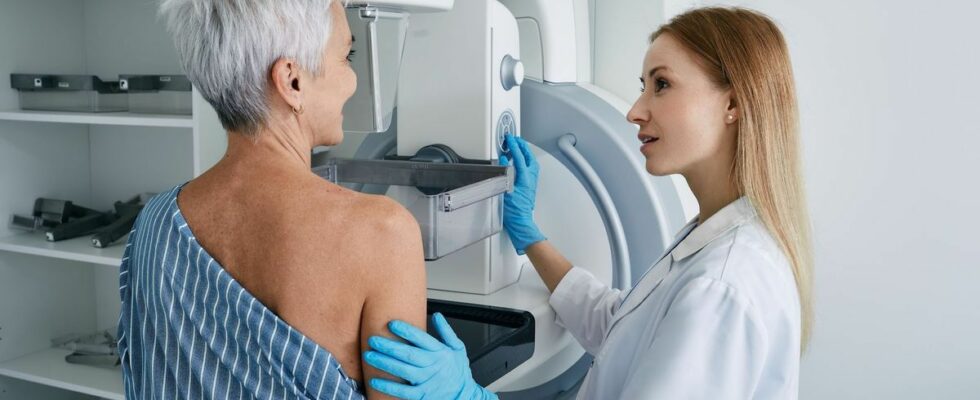Published on
updated on
Reading 3 min.
Having dense breasts can increase the risk of breast cancer and make it harder to detect. In the United States, this information will be communicated to every patient during screening.
Breast density is not a dirty word, nor is it a defect. It is, however, a condition of the breast tissue that can have consequences on your health, hence the importance of knowing if you are affected.
In the United States, breast density is now revealed after each mammogram
In this area, it is in the United States that the progress is most “palpable”. Starting this week, all mammography reports and results letters sent to patients in the United States will have to include an assessment of breast density. A decision required by the Food and Drug Administration American, while in the country, half of women over 40 in the United States have dense breast tissue.
Why? Because this density could predict a higher risk of cancer. These new notifications do not involve specific tests for patients with dense breasts, but they do recommend that women talk with their healthcare providers.
How is breast density linked to cancer risk?
Breast density is a measure of the amount of fibroglandular tissue in a woman’s breasts compared to fatty tissue. In short, the more fibroglandular tissue, the denser the breasts. As Dr. Kimberly Feigin, chief of breast imaging at Memorial Sloan Kettering Cancer Center, explains on CNN, breast density may play a role in cancer development.
- Not only can this make it more difficult to detect cancer on a mammogram because dense breast tissue, glandular elements and supporting connective tissue elements, appear white on a mammogram just as cancer does on a mammogram;
- The second reason breast density matters is that dense tissue increases the risk of developing a breast tumor by four to six times. Breast cancer tends to develop in fibrous and glandular tissues, which are more abundant in dense breasts. However, experts point out that having dense breasts does not mean that you will one day develop breast cancer, just that the risk is higher.
Breast density can only be observed by mammography and not by the naked eye or palpation. This is why encouraging women to participate in national screening and informing them after this examination seems necessary.
According to the National Cancer Institute (NCI), four categories of breast density may be noted on a woman’s imaging report:
- Breast tissue that is entirely fatty (almost entirely made up of adipose tissue);
- Scattered fibroglandular breast tissue (consisting of fatty tissue, with some small areas of fibroglandular tissue);
- Heterogeneous breast tissue (consisting of a mixture of adipose and fibroglandular tissue);
- Extremely dense breast tissue (almost entirely fibroglandular tissue).
Should you panic when you have dense breast tissue?
Medicine is clear: there is no need to panic if you are told that your breasts are dense. It is, in fact, extremely common.But knowing your breast density is a factor that allows you to have an overall view and make more informed decisions.” according to doctors.
In France, organized screening for breast cancer is also recommended for women aged 50 to 74. Women with increased breast density can therefore benefit from additional screening by breast ultrasound or breast MRI.
Do we keep the same breast density over time?
Breast density can change over time. Breasts typically become less dense with age and/or right after childbirth. Declining estrogen levels, for example, can make breasts appear fatter and less dense. For example, in younger women, higher breast density means that a breast ultrasound is more often recommended to get a quality mammogram, as noted by National Cancer Institute.
It is therefore recommended to monitor your breasts and their density at regular intervals and to discuss the subject of screening with your doctor.
